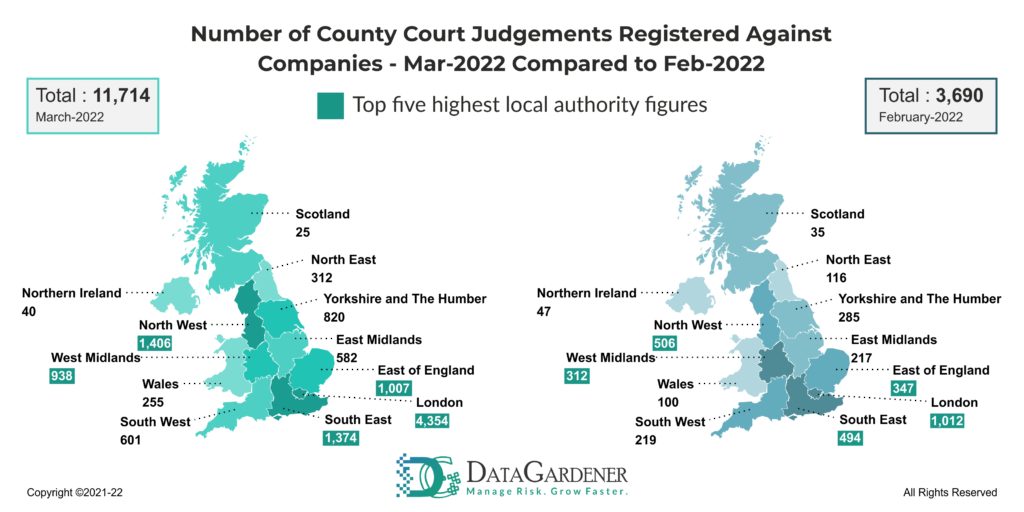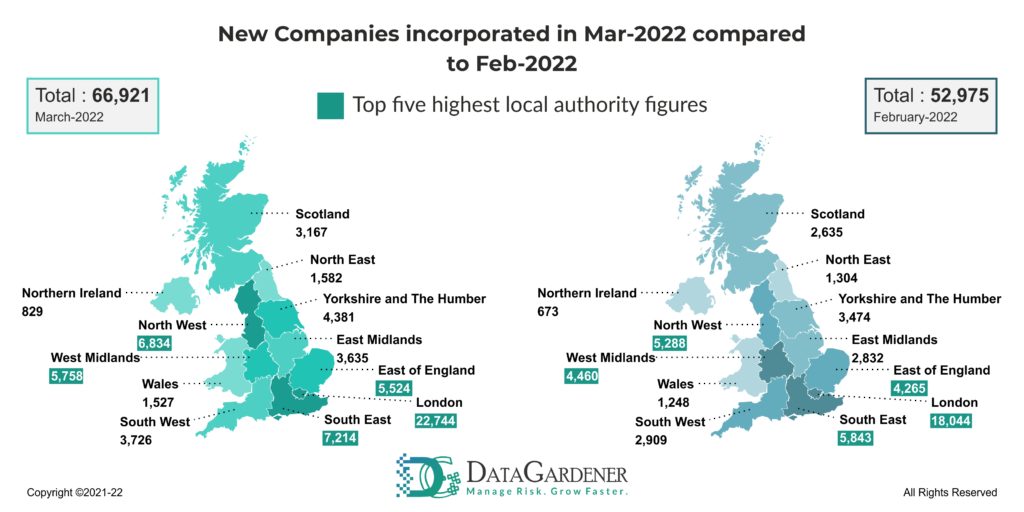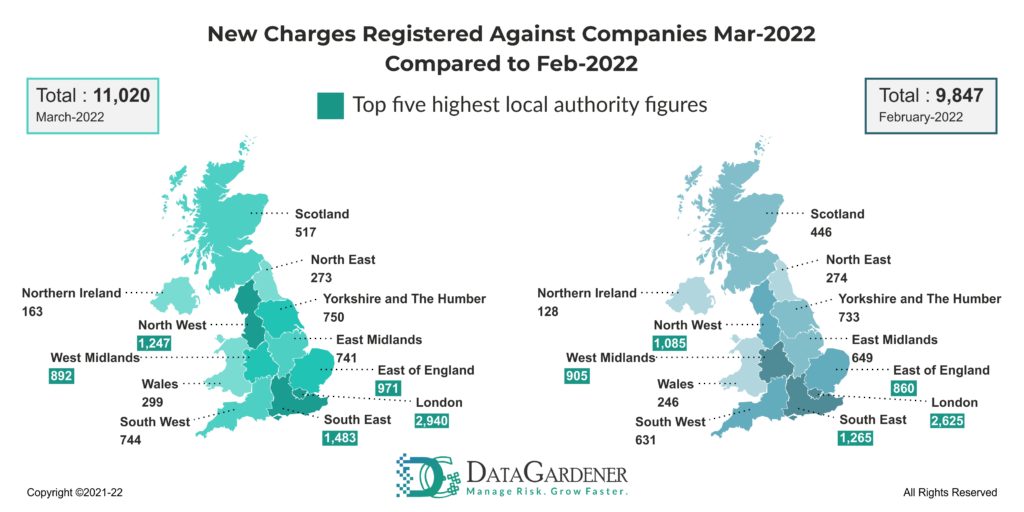Since the beginning of March, Europe has been going through one of the worst global crises in the last 20 years. Unsurprisingly, although early on into the conflict, this upheaval has already affected the UK economy. Although it’s not immediately clear why CCJs filed against companies in the UK have soared from 3,690 in February to nearly 12,000 in March. Read this April 2022 UK insights report further to learn more facts.

Despite this, companies registered have also seen a considerable increase to approximately 66,921 companies registered in March alone, according to our April 2022 UK insights report.

The other metric that has slightly increased over the past months is the charges filed, with 11,020 registered against companies this month. The trends for these broad numbers are equally accurate across most UK sectors for the month.

March – Volatile market conditions, inflation, growth?
Financial technology – April 2022 UK Insights
Financial technology is one of the most heavily invested sectors in the UK at present. KPMG estimates that in 2021 alone, UK fintech investment reached over $37 billion – an increase of around seven times the investment in 2020. This may be no surprise to some, especially considering the status of the city of London as the former financial capital of the EU. However, the post-Brexit reality meant that transferring this title to potential EU-member cities such as Dublin, Frankfurt, or Paris has many worries. This is especially true since Brexit necessitates the transfer of financial roles to other EU cities. By competing in the fintech market, the UK may retain its position as an essential financial capital working with the EU.
UK Business – April 2022 UK Insights
Currently, there are around 2,500 fintech companies in Britain. Some are incredibly successful, such as Revolut, Monzo and OakNorth Bank – all London-based. However, the British government has plans to allow fintech start-ups outside of London and the South East to thrive. Since fintech companies tend to emerge in ‘clusters’, national connectivity and collaboration in these areas could be essential to boost post-Brexit investment and accelerate the area’s growth.
This includes a plan by FinTech Scotland to focus on bringing growth, jobs and economic recovery to this region of the UK through increased investment in fintech research and innovation (R&I). This could bring around 30,000 extra jobs to Scotland whilst increasing the revenue of the Scottish fintech sector to over £2 billion.
According to research, employment growth in the UK returned to pre-pandemic levels in March, but the jobs boom appears to be short-lived due to growing living costs and the impact of the Ukraine war.
According to the business consulting firm BDO, UK companies reported the greatest rise in the labour market since February 2020.
However, the promise of all this increased investment raises an obvious yet difficult question – where exactly will this money come from? Many agree that banks are already over-extended on lending, especially with the previous COVID business loan scheme and widespread loan fraud. This is exacerbated by the UK government’s planning to make the COVID business loan scheme permanent.
UK government officials are currently in talks with banks in the UK to build replacement schemes and programmes that could continue to support small to medium-sized enterprises (SMEs). Although this may be good news to many traditional SMEs, it may mean less money is available to the fintech sector and start-ups.
Unfortunately, this is combined with the current issue of surges in inflation and falling real wages, as well as the growing question surrounding the suitability of Chancellor Rishi Sunak, who has been embroiled in scandal as of late. The perceived lack of credibility within the treasury cannot be suitable for the economy, especially with increasing energy prices, which have hit the poorest in the UK the hardest. Since national banks are intrinsically tied to these events, especially the Bank of England, there have been calls for an increase in the availability of non-bank SME lending.
Commercial lending is certainly not new, but with the increasing inaccessibility of lending through banks, it has been seeing growing demand as of late. This is compounded by the worry that large banks have too much dominance over SME lending, which stifles innovation within the fintech sector. Although government lending schemes have previously helped the area, this help is likely to recede over time – meaning alternatives to bank lending must be explored. There have already been well-documented successes of non-bank commercial lenders. Belfast Commercial Funding (BFC) is a business in Ireland that provides non-bank business funding. To date, they have made loans totalling around £28 million. The money for these loans came from the sale of Merchant Square in Belfast to PwC, now the largest of their offices outside of London.
Gareth Graham, founder of BFC, explains that when his company sought to fund the development of Merchant Square, they could not gain any loans from more local banks and could only secure funding from London and New York. Their company now has plenty of capital it is using to finance loans to businesses that are ‘already making a positive impact in the broader economy. By providing 48-hour turnaround times for loans, BFC is shaking up non-bank commercial lending and commercial finance in Ireland.
What’s happening at DataGardener?
At DataGardener, we recognise this growing need to connect potential lenders and borrowers. Solutions like our lending intelligence are designed to aid in this process – pushing innovation and investment across the UK. We are also excited to announce that we have been featured in the Founder Institute Regional EMEA F150 report as one of the fastest-growing companies across the UK, Europe, the Middle East and Africa over the past year!
Our team is always hard at work providing the best service we possibly can, and achievements such as this only motivate us further to be the number one UK provider of business and financial information.
To download a PDF version of the April 2022 UK insights report, please click on Download Report.
Other Articles:
- [Case Study] Allica Bank: Putting Data-driven Insights at The Heart of Financial Services
- How advanced analytics are revolutionising prospecting in the Lending Industry
- The Top 5 Sales Prospecting Trends and Tactics in 2022
- March 2021 What’s happening in the UK – Insights Report
- How can high quality data help your business?
